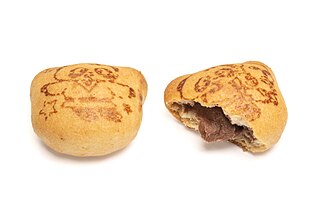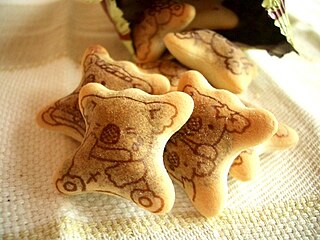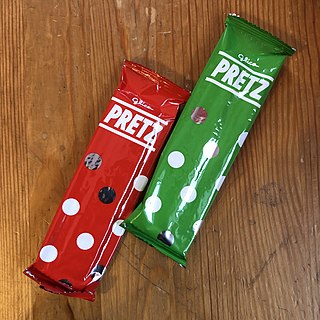 W
WHello Panda is a brand of Japanese biscuit, manufactured by Meiji Seika. It was first released in Japan during 1979. Each biscuit consists of a small hollow shortbread layer, filled with crème of various flavours. Printed on the biscuits are cartoon style depictions of giant pandas doing various activities, such as fencing and archery.
 W
WHi-Chew is a Japanese fruit chew sold by Morinaga & Company.
 W
WIchimonjiya Wasuke is a traditional confectionery company located in Kita-ku, Kyoto, Japan. It was established in the year 1000 and is operated by the 25th generation of the same family. The recent building is about 300 years old and contains many benches and stools around small tables. Local people call the shop "Ichiwa".
 W
WKabaya Foods Corporation is a Japanese confectionery company founded in 1946.
 W
WThere have been more than 300 limited-edition seasonal and regional flavors of Kit Kat chocolate bars produced in Japan since 2000, many exclusive to the country and not produced elsewhere. Nestlé, which operates the Kit Kat brand in Japan, reports that the brand overtook Meiji Chocolate as the top-selling confection in Japan from 2012 to 2014. The company's marketing campaign, which partnered with Japan Post to sell the bar in 20,000 post offices, won an award in 2010. The campaign encouraged associations of the product's name with the coincidental cognate Kitto Katsu (きっと勝つ), translated as "You will surely win", and could be mailed as a good luck charm for students ahead of university exams.
 W
WKoala's March is a bite-sized cookie snack with a sweet filling. Made by Lotte, the product was first released in Japan in March 1984. In May 1990, the products were released in the United States. Originally, the snacks used the name "Koala Yummies" in America, however currently the snacks use the name "Koala's March" in America.
 W
WMorinaga & Company, Ltd. is a confectionery company in Tokyo, Japan, in operation since 1899. Their products include candy and other confectioneries. Morinaga has had Ayumi Hamasaki and Mao Asada appear in their commercials, and in the past has used stars such as the Carpenters to advertise their products.
 W
WNissin Food Products Co., Ltd. is a Japanese food company that specializes in the production and sale of convenience food and instant noodles.
 W
WPocky is a sweet Japanese snack food produced by the Ezaki Glico food company. Pocky was first sold in 1966, and was invented by Yoshiaki Koma. It consists of chocolate-coated biscuit sticks. It was named after the Japanese onomatopoeic word pokkin (ポッキン).
 W
WPretz is a Japanese snack made by Ezaki Glico. Like Ezaki Glico's other popular snack, Pocky, Pretz is stick-shaped and comes with a texture similar to pretzels. Unlike Pocky, Pretz is dusted with seasonings instead of enrobed in a flavoured fudge.
 W
WSakuma drops are a hard candy from Japan. They are flavored with real fruit juice and are made by Sakuma Candy Co., based in Ikebukuro, Tokyo. The candies are an easily recognizable icon in Japan as they have been available since the Meiji period (1908). The candies are sold in 4-by-3.5 inch tin cans with a tin pull cap. Sakuma tins are considered collectible items, as the design frequently changes.
 W
WToraya Confectionery Co. Ltd. is a Japanese confectionery company. Its headquarters are in Akasaka, Minato, Tokyo.
 W
WYan Yan is a Japanese snack food made by Meiji Seika. It comes in a package with two compartments. One side has biscuit sticks, the other side has chocolate, strawberry, vanilla, or yogurt flavored frosting used for dipping. The sticks themselves may also be flavored. Some Yan Yan products are sold in rectangular containers with 9 sticks and dip. There is also a new version which includes two flavored dips.